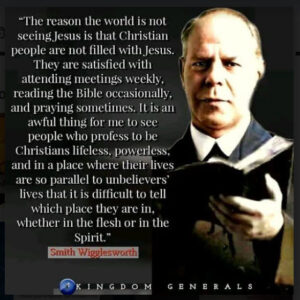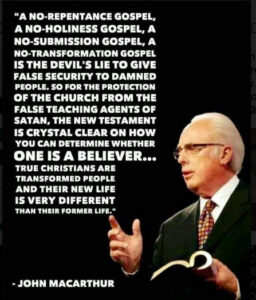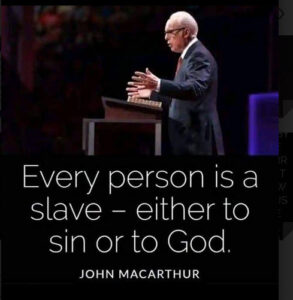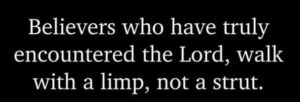

“I’ll never deny Jesus!”
Maybe that’s something you’ve told yourself or others, same as I have. And maybe you meant it, same as I did—do. It was during a conversation with a friend that I realized there’s more than one way to deny Jesus. And most of us do this every day, without meaning to and without realizing it.
Among topics my friend and I spoke of, this included the recent Olympics’ opening and closing ceremonies in France. I called them satanic. My friend countered that with, “Well, they were Pagan, but I don’t think you could call them satanic.” Her comment revealed to me that there are many—MANY—including professing Christians, including my friend, who do not realize, as I told her, that there are only two kingdoms: God’s and Satan’s. That’s all. No third option. No “I’ll take door number three, please.”
My friend disagreed and commented there are many different religions, including non-Christian ones. She recounted how when she was a child, her family visited a Native American reservation and learned that their tribe, and others, honor a great spirit. My response was that Jesus said He is the way, the truth, and the life, and that no one gets into Heaven except through Him; that I believe Him and stand with Him as the Truth. Her reply was, “Well . . . okay.” No agreement there, and I understood: We’ve been conditioned—more like browbeaten—to respect all religions as equal, and to believe that no matter the name used, all names refer to the one true God, even if such beliefs are completely antithetical to God’s Word. This has been pushed upon us by the Marxist Left, and lately this includes the Pope, who has established a One Religion conglomerate, as well as all the soft-on-sin-I’m-okay-you’re-okay churches that proliferate the scene these days. Surely that scripture that says friendship with the world is enmity with God can’t really be serious—right? Not in this DEI day and age—right? We’re bigots and XYZ-phobes if we disagree with the world—right? God wants us to get along (love our neighbor and judge not) no matter what—right? 
How many ways do you/I/we deny Jesus every day? More than we realize. A scripture familiar to many, if not most, professing Christians is Matthew 10:32-33 CJB: “Whoever acknowledges me in the presence of others I will also acknowledge in the presence of my Father in heaven. But whoever disowns me before others I will disown before my Father in heaven.” In James 2:19, we’re reminded that demons know Who God is, and they have the sense to shudder with fear. People have “movie Jesus” or “easy-going Jesus” in their minds, and therefore have lost any genuine fear of the LORD.
Maybe you, like I, thought you’d never deny Jesus, despite how frightening those End Times mark-of-the-beast Antichrist prophecies in the Bible are. I was in fourth grade the first time I was told, “Never deny Jesus. If you deny Him, you’ll be condemned to Hell.” That may seem like a harsh thing to tell someone of a young age. Many today consider it a harsh thing to tell anyone of any age: “It’s not very nice, after all. Besides, if God is love, as you Christians say, that’s not very loving.” What’s a Christian to do or say about that—right?!
“God chooses not milksops destitute of backbone, to wear his glory upon their faces. We have plenty of men made of sugar, nowadays, that melt into the stream of popular opinion; but these shall never ascend into the hill of the Lord, nor stand in his holy place, nor wear the tokens of his glory.” — Charles H. Spurgeon
John MacArthur, in his book, The Jesus You Can’t Ignore: What You Must Learn From the Bold Confrontations of Christ, in the section about the conversation between Jesus and Nicodemus, wrote, “Jesus knew something evangelicals today often forget: Truth doesn’t defeat error by waging a public relations campaign. The struggle between truth and error is spiritual warfare, and truth has no way to defeat falsehood except by exposing and refuting lies and false teaching. That calls for candor and clarity, boldness and precision—and sometimes more severity than congeniality.” 
Some ways Christians deny Jesus Christ: Staying silent in the face of every perversion and delusion being pushed these days as valid and real (and “loving” when we accept—or pretend to—whatever insanity or abomination is promoted as rational and even made legal) / calling every abortion “healthcare,” including no-restriction abortions, aka murder, even after birth / all things Pagan and New Age including tattoos, yoga, kabbalah, astrology, numerology, mediums / Freemasonry and every secret society that deceptively passes as a social or Christian association / vows, oaths, pledges to anyone other than Almighty God (such as those secret societies) / every form of divination / bitterness and resentment and the behaviors that result / cursing enemies rather than praying for them / nursed anger and unforgiveness and the behaviors that result / slander, gossip, unclean jokes and memes / and on and on ad nauseum.
Everything mentioned above (and those not included, as the list is LONG) opens small to massive doors to demons into a person’s life, home, family, business, as well as puts distance between them and God, if they prefer their sin over their relationship with Him. To embrace any one of these, or more, is a denial of Jesus as the way, the truth, and the life, as well as calls Him a liar. Can any true follower of Messiah Jesus state with sincerity that they can easily imagine Him staying silent in the face of anything listed above, or any other sin He included in His entire Word?
Read the Beatitude chapters in Matthew 5, 6, and 7. Ponder what Jesus includes there, to assess how many ways you (I, we) deny Jesus, even though we don’t mean to. The Beatitudes are not what we’re to do to be saved. They’re what someone does—how someone should behave—who is saved.
In Studies in the Sermon on the Mount by D. Martyn Lloyd-Jones, he wrote about a law minister in the Indian Government who explained at a conference that he was studying Buddhism so as to learn why it was such a dynamic religion. He stated that he’d spent much time in the USA and Great Britain, to study Christianity for the same reason. In both countries, he found Christianity to have no life to it, it was not a dynamic, living faith. So he’d turned to Buddhism to see if he could find the power, life, and dynamism he was searching for there. Jesus warned us that salt that has lost its savor is good for nothing other than to be trampled on. “You will know them by their fruit,” the Word tells us. We’re not perfect by any stretch. But we reveal which kingdom and king we belong to by the fruit we produce: our thoughts, words, acts, deepest desires of our heart, and, yes, silent, even unintentional denial of Jesus as Savior, Redeemer, King, and Lord, given authority over all – ALL, especially His followers – by Almighty God, the Most High.
Lloyd-Jones also wrote this thought-provoking statement for the times we find ourselves in (emphasis mine): “To expect Christian conduct from a person who is not born again is heresy. The appeals of the gospel in terms of conduct and ethics and morality are always based on the assumption that the people to whom the injunctions are addressed are Christian.” That one continues to give me pause.
The next four quoted paragraphs are also from Studies in the Sermon on the Mount:
“Again one of the essential and most obvious things about a Christian is that he is a man who lives always realizing he is in the presence of God. The world does not live in this way; that is the big difference between the Christian and the non-Christian. The Christian is a man whose every action should be performed in the light of this intimate relationship to God. He is not, as it were, a free agent. He is a child of God, so that everything he does, he does from this standpoint of being well-pleasing in His sight. That is why the Christian man, of necessity, should view everything that happens to him in this world entirely differently from everybody else. The New Testament emphasizes that everywhere. The Christian is not worried about food and drink and housing and clothing. It is not that he says these things do not matter, but they are not his main concern, they are not the things for which he lives. The Christian sits loosely to this world and its affairs. Why? Because he belongs to another kingdom and another way. He does not go out of the world; that was the Roman Catholic error of monasticism. The Sermon on the Mount does not tell you to go out of life in order to live the Christian life. But it does say that your attitude is entirely different from that of a non-Christian, because of your relationship to God and because of your utter dependence upon Him. The Christian, therefore, should never worry about his circumstances in this world because of his relationship to God. That, again, is fundamental about the Christian…
“Let me now lay down a number of controlling principles which should govern the interpretation of this Sermon. What is of supreme importance is that we must always remember that the Sermon on the Mount is a description of character and not a code of ethics or of morals. It is not to be regarded as law—a kind of new ‘Ten Commandments’ or set of rules and regulations which are to be carried out by us—but rather as a description of what we Christians are meant to be, illustrated in certain particular respects. It is as if our Lord says, ‘Because you are what you are, this is how you will face the law and how you will live it.’ It follows from this that each particular injunction is not to be considered and then applied mechanically or by rule of thumb, for that would of necessity make it ridiculous. People come to this Sermon and say something like this: ‘Take that injunction, “if any man will sue thee at the law, and take away thy coat, let him have thy cloke also.” If you did that you would soon have nothing left in the wardrobe.’ That is the kind of approach that must not be made. You must not take separate injunctions and say, ‘This is to be applied.’ That is not the way to look at it. What is inculcated is that I should be in such a spirit that under certain circumstances and conditions, I must do just that—throw in the cloke, or go the second mile. This is no mechanical rule to be applied; but I am such a person that, if it is God’s will and for His glory, I do so readily. All I am and have are His, and are no longer mine. It is a particular illustration of a general principle and attitude….

“None of these descriptions refers to what we may call a natural tendency. Each one of them is wholly a disposition which is produced by grace alone and the operation of the Holy Spirit upon us…. My immediate reaction to these Beatitudes proclaims exactly what I am. If I feel they are harsh and hard, if I feel that they are against the grain and depict a character and type of life which I dislike, I am afraid it just means I am not a Christian. If I do not want to be like this, I must be ‘dead in trespasses and sins’; I can never have received new life. But if I feel that I am unworthy and yet I want to be like that, well, however unworthy I may be, if this is my desire and my ambition, there must be new life in me, I must be a child of God, I must be a citizen of the kingdom of heaven and of God’s dear Son.
 “Let every man examine himself.”
“Let every man examine himself.”
I recently told God that my own heart is still more stone than flesh, especially whenever I watch/hear certain politicians and TV news people and pundits, which I barely tune into these days. I told Him I cannot change my own heart, so asked Him to do so by His grace—because God alone can change a heart. He followed up by asking me what my motivation was for this request of Him. What I answered is between my Father and myself, but I offer this: He wants us to be completely honest with Him—not that He doesn’t already know what’s really in our heart, but so we can reveal it to ourselves, repent if needed, and ask Him for sanctification. It’s no easy matter to stand apart from the world, especially having been born with a sin-nature, one that puts self and idols ahead of God and others, which we more often than not don’t see this for what it is. It’s one reason Jesus told us we must “count the cost,” should we wish to follow Him. When we go along with the world, we have to go against God in order to do so. We don’t see it as denying Jesus before man, but do we honestly believe Jesus will agree with us? 
“If we believed something contrary to Scripture, it was a choice we made as individuals while ignoring the warnings, teachings, and instructions of the Word of God. Men are not without fault for believing lies. All they had to do was go to the Word of God and defer to it in all manners spiritual, ignoring and rejecting anyone or anything that would sound discordant and be in contrast to what the Bible says.” — Author Michael Boldea, from his Facebook post: Tuesday, August 20, 2024, The Last Days Of The Church XLI
This denial tendency is something each of us contends with, and is deeply personal between us and Jesus. Just as entry into His Kingdom is “turnstile” solo, rather than side-by-side or floodgates-wide, so is our relationship with Him One-on-one. Imagine treating a loved one with such disrespect and disregard as we all too often do to our Almighty God and Father, our Lord and Savior Jesus Christ. Oh, yeah—we do that, too, don’t we? Let’s go forward asking ourselves how much of Jesus others see in us when they interact with or observe us? Let’s also do as Jamie Walden has suggested and ask Jesus how He sees us. I don’t know about you, but this, too, gives me serious pause.

I invite you to join me in this prayer: Almighty God and Father, forgive me for the times I’ve denied You and my Lord and Savior Jesus Christ by not standing up for or living the truth of You, Your Word, and the ways of Your Kingdom, rather than the world’s, which is Satan’s—but only until Your return, LORD. In regard to my relationship with You, I ask as is written in Psalm 51, for You to create in me a clean heart and to renew in me a resolute spirit in Your regard, to change my heart so my love for You grows more and more into love as that my LORD Jesus has with You, Father, and You with Him. I ask You to, by Your grace, cause me to speak boldly of You, Your Kingdom, and Your Truth, holding fear of You in my heart rather than fear of any person’s disagreement or disapproval. Not with arrogance or self-righteousness, Father, but in the way our Lord Jesus told us: By the truth found in Your Word and with love, but also not to nag those who continue to walk in rebellion against You, as it may be You Who is giving them over to the desire of their heart to live separate from You: LORD, I cling to You! Guide me in Your ways, Father. Grow me spiritually so others see Jesus more and more when they see me—I am still so very far from this, Father, though I hold to Your promise that Jesus perfects by His love those whom You have given Him. In Jesus’ holy name, I ask this of you. Amen. (Please visit the two timely, related links provided below: they’re more significant for the times we’re in than you may now imagine.)
Leave a Reply